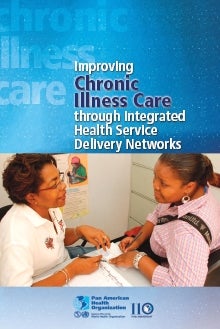Brasilia, 09 May 2020 (PAHO/WHO) - The new PAHO document, Improving Chronic Illness Care through Integrated Health Service Delivery Networks, examines the linkages between the chronic care models and the Integrated Health Services Network (IHSDN) approach. It describes the main components of the Chronic Care Model (CCM) and the IHSDN and then identifies points of intersection, with an emphasis on the care requirements of the chronically ill.
Integrated Health Service Delivery Networks (IHSDNs) are a group of organizations that provide, or arrange for the provision of, equitable and integrated health services to a defined population. IHSDNs are held accountable for their clinical and financial outcomes and, in general, for the health of the population they serve.
The Chronic Care Model is a comprehensive system for organizing chronic disease care within IHSDNs. The CCM is is patient-centered, as well as evidence and population-based and it has been successfully applied in strategies to organize and improve chronic care in developed and developing countries.
PAHO promotes the integrated management of non-communicable diseases with a preventive focus, based on equity, the participation of the individual, his or her family, and the community, and a multisectoral approach conducive to developing resources trained in chronic care and quality improvement programs.
PAHO supports the strengthening of primary health care (PHC) and the integrated, population-based management of chronic diseases which features clinical guidelines and evidence-based protocols, monitoring, and improvement of care, and the organization of proactive care.
PAHO recognizes the patient's central role in managing his or her health care through self-management programs, supported by health policies and community organizations. These characteristics are critical to achieving functional, successful IHSDNs that are accountable for providing equitable and quality services to the population served.




